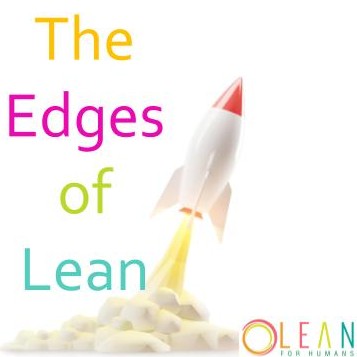
15.2K
Downloads
136
Episodes
The Edges of Lean explores topics in continuous improvement (lean thinking, creative problem solving, six sigma) that get overlooked. Meet the people practicing lean in odd places or with different twists, always with a focus on respect for people and continuous learning.
Episodes

Thursday Oct 17, 2024
Ep 134 Continuous Improvement in a Time of Political Turmoil with Phyllis Leavitt
Thursday Oct 17, 2024
Thursday Oct 17, 2024

It’s election season in the United States, and it affects us all, no matter how involved we are in politics. Deep fractures run through our families, neighborhoods, and workplaces, affecting our ability to live and work with each other. Phyllis Leavitt’s new book, America in Therapy, directly addresses this problem and what we can do about it. She joined me at the Edges of Lean to talk about the intersections of political division and continuous improvement.
Phyllis Leavitt
Phyllis Leavitt’s journey into psychology began long before her formal education. Growing up in a close-knit community, she was always drawn to helping others and understanding the complexities of human emotions. This passion led her to volunteer at local shelters and community centers during her teenage years, where she witnessed firsthand the profound impact of trauma and the power of compassionate support.
Phyllis Leavitt graduated from Antioch University in 1989, earning a Master's in Psychology and Counseling. She co-directed Parents United, a sexual abuse treatment program in Santa Fe, New Mexico, until 1991, after which she dedicated herself to private practice full-time. Over the course of 34 years as a psychotherapist, Phyllis worked with children, families, couples, and individual adults, specializing in issues related to abuse and dysfunctional family dynamics, their consequences, and the essential components of healing. She is the author of two books, "A Light in the Darkness" and "Into the Fire."
KEY TOPICS IN THIS PODCAST:
00:01:44 Motivation for writing the book "America in Therapy"
00:06:00 The role of dysfunctional family dynamics in societal issues
00:11:48 Identifying and understanding symptoms of trauma and abuse
00:20:00 Bringing psychological principles to national conversations
00:26:10 Importance of seeing individuals, not labels
00:31:17 The need for deep listening and understanding of each other's stories
00:35:11 Introduction to Leavitt's book "America and Therapy"
00:39:04 Advice for young people: Find appropriate ways to contribute
KEY TAKEAWAYS:
- Family dynamics and trauma influence behaviors across workplaces and society.
- Labeling people diminishes their humanity and escalates conflict.
- Sharing personal stories fosters empathy and bridges divides.
- Small acts of kindness can create a positive societal ripple effect.
- Dysfunctional family dynamics lead to symptomatic behaviors in individuals.
- Mass shootings may indicate broader societal dysfunction.
- Healing from abuse requires rebuilding bonds of compassion and care.
- Psychology provides tools for deep listening and conflict resolution.
- Safe spaces for dialogue are essential for sharing experiences.
- Individuals can promote positive change through kindness and advocacy.
Memorable Quotes From Phyllis Leavitt.
"Healing from trauma is not just about rebuilding oneself; it's about nurturing the bonds of compassion that connect us all."
CONNECT WITH Phyllis Leavitt
Website:https://phyllisleavitt.com/
Linkedin: https://www.linkedin.com/in/phyllis-leavitt-630179255
X/Twitter: https://twitter.com/PhyllisLeavitt2
IG:https://www.instagram.com/pel2347/

No comments yet. Be the first to say something!